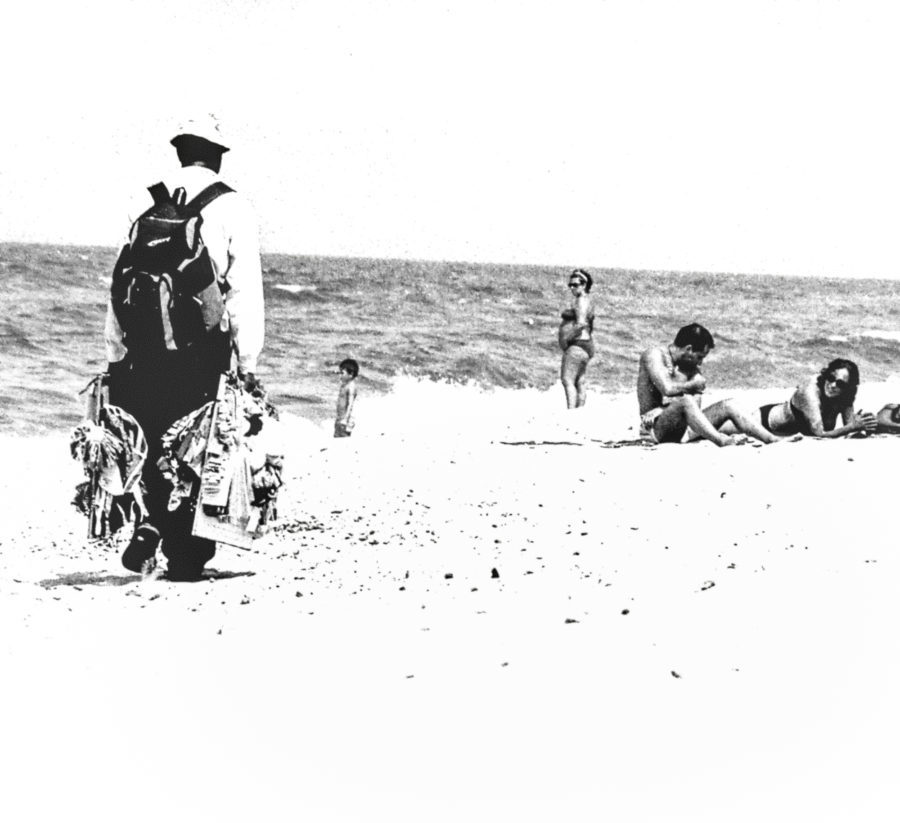I have previously warned that austerity economics and moral relativism are giving rise to a new fascism, last seen between the World Wars. First published in English in 1926, perhaps the most influential text of that period was Oswald Spengler’s The Decline of The West, which blamed Slavic and other ‘degenerate’ races for Europe’s impoverishment. The counterpoint of his argument was that ‘noble’ Aryan blood, whether Germanic or Anglo Saxon, was the highest expression of humanity. This slow train of pseudo-scientific conjecture terminated in the nightmare of the Holocaust, or Shoah.
Until recently merely of historic concern, debased Social Darwinism is back in vogue. I fear a new corporatised Shoah of economic liquidation and social-atomisation is on the horizon. The rehabilitation of Italian dictator Benito Mussolini’s reputation by Steve Bannon, and others, is laying the tracks.
The words of Stefan Zweig, who committed suicide in Brazil after fleeing Hitler’s Europe are returning to haunt us: ‘I feel that Europe, in its state of degeneracy has passed its own death sentence.’[i]
There is evident an increasingly differentiation between ‘them’ and ‘us’, involving unedifying forms of class warfare and demonization of those outside the dominant culture, whether foreigner, migrant or displaced. ‘Killing an Arab’, the central theme of expurgation of ‘the other’ in Albert Camus’s L’Etranger ‘The Outsider’ is writ large in our culture.
Within this discourse lies the vexed question of immigration or mass migration. Who should be expelled? Who can stay? And why?
The mainstream Left – the hopeless and incoherent Left – has hitherto uncritically endorsed mass migration and diversity, equating any form of immigration control with incipient fascism. This is the soppy, unthinking multi-culturalism of ‘Nadia’ Guardian reader. During the Blairite regime one of his ministers Barbara Roche, gave carte blanche to unrestrained abuse of the asylum system, telling officials, ‘Asylum seekers should be allowed to stay in Britain. Removal takes too long and it’s emotional.’[ii] How times have changed.
A Wandering Cosmopolitan
Let me lay my multi-racial and cosmopolitan cards on the table. I am a mongrel breed of Irish Catholic – a disease from which I am still recovering – Austrian Catholic; with a soupcon of Jewry, and distant Welsh. Educated in Britain, America, and Ireland, and much travelled, I am a shaggy dog of various stamps. Labels of multiculturalism and internationalism are plastered all over me. Paddington bear from Peru arrived in London. I have no built-in prejudice against other races in the pot.
I believe in the idea of the best man or woman for the job, but baulk at political correctness, affirmative action or quotas, and all other self-protectionist strategies that justify the promotion of the indigent or semi-competent. I also believe that anyone should be given the opportunity to develop and fulfil their potential in a chosen fields, now increasingly difficult in a world of zero-hour or short-term contracts.
Britain in Brexit limbo is a crucible for these cross current. Babylondon, a Babel’s Tower of voices and many vices; a petri-dish for immigration policies over which I have had a ringside seat in London’s extradition courts for the past year
It is taking on the appearance of the coliseum with non-nationals being thrown to the lions, for the amusement of a generation of global political leaders on a spectrum from Caligula to Nero; Gore Vidal’s ‘United States of Amnesia’[iii] has gone viral.
In the 1930s the UK was a refuge for those extirpated by fascism. Freud fled to the UK in 1938, alongside numerous Jewish intellectuals, including the historian Eric Hobsbawm and jurist Hersh Lauterpacht, who nourished the UK’s intellectual life for decades. That was then, and British tolerance, an indicium of the national character, is not as open to the reception of the poor huddled masses today, while under Trump, America is developing a siege mentality.
The idea of American universities being staffed by left-wing intellectuals such as Thomas Adorno and Hannah Arendt, as in the 1950s, is now decidedly quaint. In Trump-land even moderate liberalism is an invitation to censure or disempowerment by squeamish authorities. A quick word from our sponsors. A quiet petition. A public shaming for the temerity to speak the truth in Post-Truth-land.
The New Determinants
The reception of the genuinely talented, who add spice to the melting pot, is still desired by the UK authorities, and perhaps America. The question has narrowed to what adds and what detracts? These new determinants are increasingly based on financial calculation, or on the requirements of the service industry; servility and obsequiousness have acquired a new currency.
As a result of its colonial heritage, the UK had to accommodate former imperial subjects from the Caribbean, South Asia, and even its neighbouring island. Now the Home Office is rigorously scrutinising all claims, as I discovered in the case of a white South African client invoking the ancestral clause.
The apocalyptic warning by Enoch Powell at the time of mass immigration in the 1960s was of ‘Rivers of Blood’. The inflammatory racism was reprehensible, but Powell’s prophecy was not entirely without foundation.
The question of how those communities would ultimately integrate has been inadequately settled, with Asians in a city like Bradford still ghettoized: a sealed-off and closed community, not so much Rivers of Blood, as opposite sides of the fence.
Norman Tebbit’s famous remark that to be properly British one should have to pass a cricket test of loyalty is apposite in that many second generation Asians still support Pakistan or India in cricket. The same can be said of the Irish in their preferred sports.
Upon migrating anywhere it is surely advisable to wear the colours of the host nation, without necessarily negating your own inheritance. There is an obligation to adapt and make reasonable accommodations, and the host nation may absorb aspects of your culture too, just as the Indian curry has been taken to the bosom of the UK, all too literally in some cases.
Caribbean, and indeed Irish communities, have settled better, but racially targeted police surveillance was a phenomenon in places such as Brixton, and IRA bombings led to the false prosecution of the Guildford Four and Birmingham Six.
Acceptance is often on the terms of the host nation. The integrated Irish now excel at light entertainment, from Danny La Rue to Graham Norton via Tony Clare. They offer amusement but not much more. Perhaps we have found our level, considering public intellectualism is virtually extinct in Ireland. At home, indulgence of ‘the craic’ has brought sub-Trumpean political discourse, and the circus clowns of our political, legal and media classes.
New Species of Racism
The Labour Left in its present UK incarnation displays a distinctly contradictory attitude towards multiculturalism, and indeed racism. Ken Livingston was surely not an isolated case of virulent antisemitism. Unfortunately anti-Zionism easily morphs into outright antisemitism in supposedly radical left circles. Why?
Even before fascism there was widespread hatred of the shadowy figure of the cosmopolitan Jewish financier, epitomised by members of the Rothschild family. Anti-capitalism easily falls prey to fictitious Zionist financial conspiracies to rule the world, regurgitating tropes from the Protocols of Zion forgery. The ingenuity and wit of hard-working Jewish communities around the world is rarely acknowledged. This attitude is not evident across the Left, and certainly not in Corbyn. But it is there.
Also – and here I enter transgressive territory – the rise of antisemitism is linked to the influence of the rich Asian community within the Labour Party. The hostility of Islam towards Israel and Judaism has transmuted into discernible antisemitic attitudes in a purportedly tolerant and multicultural party. The Jewish community can be forgiven for sensing a throwback to another era.
Brexit extremists are also hostile to multiculturalism, and inheritors of Enoch Powell’s odious strain of English nationalism. The objection to Europe is at one level an objection to undeserved immigrants poaching ‘our’ jobs. It is Spenglerian in that much of the ire is directed against the Slavic ‘degenerate’ races, and despairs at how a ‘nanny’ state permits degenerate lifestyles among the indigenous English working class.
Puritanism often morphs into sexually-sanitised racism, just as J. Edgar Hoover targeted Martin Luther King’s tomboy promiscuity. It is no coincidence that non-nationals are often portrayed as sexually degenerate, while the religious mania of the U.S. Republican Party promotes a generally hypocritical sexual purity.
We are seeing a growing hostility towards miscegenation, mixed marriages and corruption of bloodlines. This is apparent in Ireland, where members of the blue-blooded, ‘Anglo-Norman’, Fine Gael party display an absurd sense of entitlement.
The Right also adduces arguments about abuse of welfare or health care entitlements by migrants. Socio-economic rights are often denied altogether. It all leads to the impression that migrants are sponging off us.
Other disturbing trends are also on the rise. The vigilante Catholic Right inveighs against alleged paedophiliac Asian men, while ignoring the litany of its own abuses.
Britain is enmeshed in Brexit dialogue, and arguments about multiculturalism are also pertinent in other jurisdictions. Indeed it has become the burning European issue.
Thus in France their version of a cricket test was to ban the wearing of garments such as the hijab in public institutions. This was upheld by the European Court of Human Rights in S.A.S. in 2014[iv]; where it was justified within the parameters of secular ordre publique. The consequences were profound: civil unrest, bombs, and murder of journalists and cartoonists.
Yet orthodox Islam has no truck with the core Enlightenment principle of freedom of speech, which an English judge describes as the ‘lifeblood of democracy’. As Stephen Sedley points out, the word ‘lifeblood’ is particularly apt, since ‘free speech enables opinion and fact to be carried round the body politic.’[v]
But extremism is not restricted to Islam. The Marxist and gay Italian film director Pasolini may have alienated the Roman Church, and mafia, in his 1971 One Hundred Days of Sodom to the extent that he was murdered at their behest on a beach near Rome, with a gay hustler framed for the crime.
Let us nonetheless hesitate before regulating expressions of culture, particularly as Muslim women see their dress code as an expression of who they are, and ignore the views of some American feminists. The Turkish secular state set up by Ataturk took a similar exclusionary stance towards religious garments; yet, as Orhan Pamuk’s splendid 2002 novel Snow illustrated Turkey was still beset by religious fundamentalism. Liberty demands tolerance of cultural distinctions, albeit there are limits.
It is clear that excessive multicultural tolerance has permitted the rise of religious fundamentalism, extremism, and indeed terrorism in ‘Londonistan’. Fundamentalism is not, however, limited to Islam, and actually the word can be traced to descriptions of early twentieth century Protestantism. Catholicism has a similar strain – seen vividly throughout Irish history under autocrats such as Archbishop McQuaid.
The Outsider
I recently read The Meursault Investigation, written by the Algerian writer Kemal Daoud in 2015. The book is a rebuke to the greatest Algerian, and indeed French, writer of the last century Albert Camus, and his iconic The Outsider, about, as aforementioned, killing an Arab.
The book is implicitly critical of Camus’s putative racism or imperialism, or at least, a lack of empathy with the murdered Arab. It is certainly not univocally hostile, and the author himself has been the subject of a fatwa, and clearly despises what Camus presaged, namely the rise of religious extremism; one aspect of the multicultural meltdown.
The book concludes with a consideration which Camus would identify with, namely how do we hold on to the precious commodity of truth?
The attribution of racism to Camus has been made by others, including Edward Said in his 1993 Culture and Imperialism, which argued he essentially approved of French dominion over Algeria. But Camus is unfairly criticised. He was in origin a member of the French community in Algeria, doubly despised by mainland French as a pied noir outsider, and by the Islamic majority population of Algeria as an occupier.
Above all he was a product of the Enlightenment, and the French tradition of letters and reason. A devotee of Voltaire with an epigrammatic style redolent of Pascal. There is an austerity about his prose, but also a romantic lyricism born of a mongrel Algerian background.
In his writing on Algeria – as in his 1951 The Rebel, a book length treatment of secular extremism in the French Revolution – there is a distaste for fundamentalism, secular or religious, which is why he remains relevant. It should be stressed that he advocated co-existence between the transplanted French and native Islamic population in Algeria and condemned the torture and the death penalty inflicted on the Islamic population by the French authorities, graphically conveyed in the 1966 film The Battle of Algiers.
This all seems impeccable multiculturalism, but Camus saw clearly that there was going to be bloodletting in Algeria. He despised religious fervour, just as he had contempt for the secular extremism of the French Revolutionary Terror. Those qualities of middle-of-the-road restraint are in short supply today.
So what conclusions do I draw from limbo Brexit-land, and with Euro-wide fascism and racism on the rise, about multi-culturalism?
Here are some tentative, provocative and perhaps disturbing conclusions.
The liberal consensus based on such values as the Rule of Law, humanism, tolerance, the promotion of excellence irrespective of race, and affirmative action to compensation for historic discrimination has broken down. In an Age of Extremes, the Left and the Right are demonising each other. Reason and moderation are in desperately short supply, as are the Enlightenment values of Camus. Alas, extremism will continue to rise even in multicultural Britain.
The Extradition Courts in which I appear are going to be flooded with cases resulting in deportations of ‘undesirables’. Only economically productive non-nationals will be allowed to remain in post-Brexit Britain. All non-nationals, perhaps even Irish, will become part of the precariat. Racially motivated crimes and targeting will continue apace, unchecked by an increasingly authoritarian state.
Merkel’s Open Door policy cannot last, there are limits to the number the continent can accommodate, and the interests of indigenous workers are damaged by an incessant stream of migrants willing to work for less and longer.
But given the state of Europe with fascist enclaves in Hungary, Poland and the iridescent fascism in Austria – no to mention the deep-seated extremism of Irish neo-liberalism – Britain will probably be the last place to see the Rivers of Blood flow. There are still residues of those precious qualities of rationality, rigour, tolerance and humanism espoused by Camus.
All is not lost in Britain, but even in the polyglot cosmopolis – the ultimate melting pot that is London – the sense is that multicultural tolerance has been eroded substantially, and is being replaced by fractious intolerance, class warfare, intimidation and social fragmentation. The European experiment is over, in truth, having contributed to its downfall, but islands of humanity endure.
We rely on contributions to keep Cassandra Voices going.
[i] Stefan Zweig, The World of Yesterday, London, Pushkin Press, 2014, p.425.
[ii] James Slack, ‘Conman Blair’s cynical conspiracy to deceive the British people and let in 2million migrants against the rules: Explosive new biography lays ex-PM’s betrayal bare’, The Daily Mail, February 27th, 2016, https://www.dailymail.co.uk/news/article-3466485/How-Blair-cynically-let-two-million-migrants-Explosive-biography-reveals-PM-s-conspiracy-silence-immigration-debate.html, accessed 6/2/19.
[iii] Gore Vidal, Point to Point Navigation, p.55, London, Little, Brown, 2006.
[iv] Eva Brems, ‘The European Court of Human Rights and Face Veil Bans’, E-International Relations, February 21st, 2018, https://www.e-ir.info/2018/02/21/the-european-court-of-human-rights-and-face-veil-bans/, accessed 6/2/19.
[v] Stephen Sedley, ‘The Right to Know’, 10th of August, 2010, The London Review of Books, https://www.lrb.co.uk/v22/n15/stephen-sedley/the-right-to-know, accessed 6/2/19.




